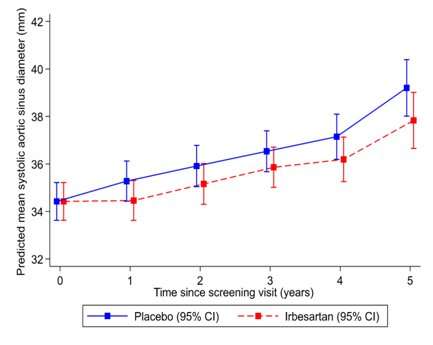Blood pressure drug slows aortic dilatation in Marfan syndrome

Treatment with a drug to lower blood pressure slows enlargement (dilatation) of the aorta in children and young adults with Marfan syndrome, according to late breaking results from the AIMS trial presented today in a Hot Line Session at ESC Congress 2018.
Dr. Michael Mullen, principal investigator, St Bartholomew's Hospital, London, UK, said: "The trial showed a clinically important reduction in the rate of aortic dilatation in children and young adults with Marfan syndrome treated with irbesartan, potentially delaying the need for elective surgery and reducing the risk of complications and death."
Marfan syndrome is an inherited condition which affects one in 5,000-10,000 people. It causes the elastic fibres in the body to become too stretchy, and patients may have very long arms and legs. The aorta, the body's main artery, progressively enlarges, potentially leading to tears, rupture, and death. To prevent these events, surgery to replace the aortic root may be performed when dilatation reaches 4.5-5 cm. Slowing aortic dilatation in Marfan syndrome is an important treatment objective.
Previous studies have shown that beta-blockers, angiotensin-converting enzyme inhibitors, and angiotensin II receptor blockers may reduce the progression of aortic dilation and its complications; however, up to 50% of patients with Marfan syndrome cannot tolerate beta-blockers because of side effects.
AIMS is the first randomised trial to evaluate whether the angiotensin receptor blocker irbesartan, a medication used in some patients with high blood pressure, reduces the rate of aortic root dilatation in Marfan syndrome. The trial enrolled 192 patients aged six to 40 years from 22 centres in the UK. All patients received a beta-blocker if tolerated. Patients were randomly allocated to irbesartan once daily (150-300 mg depending on body weight) or placebo.
In both treatment groups the median age of participants was 18 years, with 25% aged between six and eleven years. More than half (56%) took beta-blockers during the study. Aortic diameter was assessed using transthoracic echocardiography at baseline and at yearly intervals for up to five years.
During the five-year follow-up, although the aorta continued to enlarge in both groups the rate of dilatation was slower in the irbesartan compared to placebo group (0.53 mm versus 0.74 mm per year, respectively) - a statistically significant reduction of 0.22 mm per year (95% confidence interval 0.02-0.41 mm per year, p=0.030), see figure. The rate of adverse events including the need for cardiac surgery to replace the aortic root was similar in the two groups.
Dr. Mullen said: "Our finding of reduced aortic dilatation with irbesartan over and above standard medical therapy suggests an important clinical effect that may prevent complications and ultimately delay or obviate the need for surgical intervention in patients with Marfan syndrome. Importantly, irbesartan was well tolerated, even in children."














